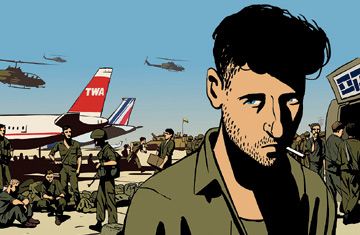
Film director Ari Folman is probably the only man in Israel whose cartoon image is better known than his real face. On the streets of Tel Aviv, Folman — a tall, grizzled figure — passes by unnoticed. But his animated self, as the protagonist in the film Waltz with Bashir, has seared itself onto the Israeli imagination.
The notion of Folman making a feature-length cartoon starring himself isn't as self-indulgent as it sounds. Waltz with Bashir isn't a whimsical WALL-E–style adventure or a cutesy Disney cartoon. Part documentary and part memoir, it details Folman's odyssey to retrieve the lost memories of his youth as a bewildered soldier under fire in Beirut during the 1982 Lebanon war. Through flashbacks, visits to a psychiatrist and stories told by old war buddies, Folman's animated self follows his real-life quest to remember what happened. (See pictures from the best anime movies.)
Waltz with Bashir, which opened in the U.K. in mid-November and opens in the U.S. in December, has already found fans well beyond Israel's borders: it earned a Palme d'Or nomination at Cannes and will be in the running for Oscars next year. The film's images may seem simply drawn, and move at a sleepwalker's dreamy pace, but Folman uses them to capture war's surreal brutality. The title refers to a scene when an Israeli soldier, pinned down by sniper fire from the surrounding Beirut apartment blocks, leaps up and starts firing his heavy machine gun as he waltzes across a rooftop past posters of murdered Lebanese President-elect Bashir Gemayel. It's a powerful moment, and eerily magnificent.
But it was one that Folman chose to forget. After leaving the Israeli army at the end of his three-year hitch, he broke all contact with the men in his platoon. "I didn't call them, I ignored their reunions," he says, sipping Turkish coffee in his Tel Aviv studio. "I would've lived my life without dealing with [my war memories]." Then, in 2003, a chance encounter with a psychiatrist opened cracks in his willful amnesia. Soon after, the terrible secret of Folman's worst memory came rushing out: under orders, he and his men had guarded the outer ring of the Palestinian refugee camps Sabra and Shatila while Christian Phalangist militiamen went inside and butchered hundreds of women and children.
Waltz is more than simply a war movie; it's about memory, lost and regained, and how the mind copes with horrible things. "My mother and father were both Holocaust survivors," Folman says. "My mom talks about it always. My father never does. We all have our own strategies for dealing with tragedy." His strategy for over 20 years was to bottle it up. "I'd never heard my own story. It never left my mouth."
After Folman's memories came back full blast, he delved into other ex-soldiers' experiences of the Lebanon war. For Israelis it was a botched misadventure similar to America's war in Vietnam, and one nobody dared speak about afterwards. Folman posted notices on the Internet, asking veterans to come forward with their stories. He got over a hundred replies, and skillfully weaved into the film his ex-comrades' stories — and their nightmares. Waltz opens with a pack of snarling dogs racing through Tel Aviv's streets to converge outside an apartment belonging to a friend of Folman's. During the war, this friend's task was to shoot the watchdogs guarding the villages before Israeli troops carried out night raids, and for years after, the dogs haunted his sleep.
Waltz also conveys the jarring dislocation that soldiers, caught in a twilight state between reality and hallucination, feel coming home. "In Iraq, it takes American soldiers maybe a few days to go back home, giving them a little time to adjust," says Folman. "For me, it was a 20-minute helicopter ride and I was back in Haifa, where the war didn't exist." We follow his shell-shocked, teenaged self as he wanders the streets, numbly watching a rock guitarist on a store TV, kids in an arcade blasting video baddies, and finally his ex-girlfriend dancing with another guy under disco lights that are like the flares showering down on Beirut.
At the end, Waltz steps out of animation, using TV news footage to show the carnage of Sabra and Shatila. "I didn't want people to walk out thinking this was just another cool anti-war movie," says Folman. "I wanted to remind them that this horrible event really happened, and we Israelis were a part of it." After seeing his film, nobody is going to forget.
